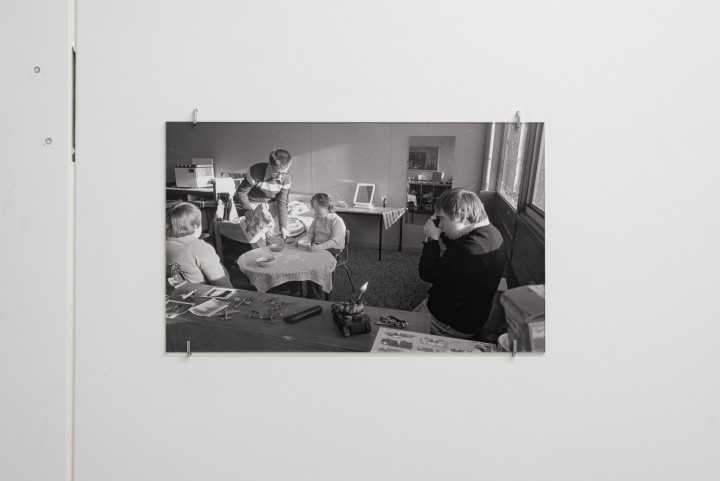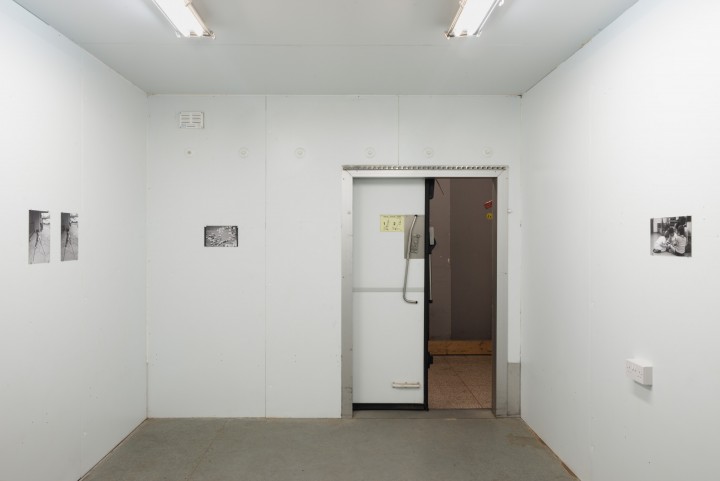Scottish Art News
Latest news
Magazine
News & Press
Publications
Franki Raffles at Gallery Malmo
By Neil Cooper, 27.01.2023

Franki Raffles would have fitted in well with the soon to be demolished former supermarket in North Edinburgh currently showing a small selection of her photographs. Since 2018, the space has been where the DIY-run Gallery Malmo has called home, and is the sort of roughshod space that Salford-born Raffles might well have scrutinised with her lens, especially if were filled with the communal life of women at labour.
In her short life, Raffles became best known for her images illustrating Zero Tolerance, the then Edinburgh District Council’s 1992 campaign that laid bare the uncomfortable truths of male violence against women. The Zero Tolerance charity, co-founded by Raffles with Evelyn Gillan and others from EDC’s Women’s Committee, continues its work today.
In the decade prior to the campaign, Raffles developed a practice that took her from the Isle of Lewis to Zimbabwe, the then Soviet Union, China and Tibet, her images documenting the everyday lives of women across the world. After moving to Edinburgh in the mid 1980s, Raffles’ work was similarly rooted in a sense of community that continued up to her untimely death in 1994 aged thirty-nine.
The eight images presented at Gallery Malmo are drawn from two projects; We Can Take Pictures (1983-1985); and Photographers with Special Needs (1983-1985). Both sets capture a sense of wonder felt by the children in the pictures as they explore the photographic process in a workshop situation. On a stool in the container where the photographs are displayed sits an original copy of We Can Take Pictures (1985), an instructive publication that explains the rudiments of photography in an enthusiastically accessible manner accompanied by Raffles’ images.
 Install shot of Franki Raffle's work with Gallery Malmo. Photo courtesy Joseph Wilson.
Install shot of Franki Raffle's work with Gallery Malmo. Photo courtesy Joseph Wilson.
Together, these create several layers that go beyond documentation of the event itself to show off young lives in motion. This is delivered with a warmth and joie de vivre that shines through all of Raffles’ work. Seen several decades on from when the photographs were taken, it is also a glimpse back at a pre digital age when such insight was given the resources to thrive.
Raffles’ work has previously been seen at Glasgow School of Art’s Observing Women at Work (2017) exhibition, presented in association with Edinburgh Napier University’s Franki Raffles Archive Project. More recently, images by Raffles were included alongside work by Margaret Salmon in Home Economics (2021) at Glasgow International Festival of Visual Art.
With Raffles’ substantial archive held by the University of St. Andrews Library’s Special Collections Division, this show is an evocative taster of a vital body of work that requires to be given its dues with a major retrospective.
The Franki Raffles exhibition at Gallery Malmo can be viewed by appointment until 29thJanuary. Contact info@gallerymalmo.uk to arrange. The Franki Raffles Archive can be found at www.frankirafflesarchive.org. The Franki Raffles Photography Collection is at https://collections.st-andrews.ac.uk/photographs/collection/franki-raffles-photography-collection/555035.




